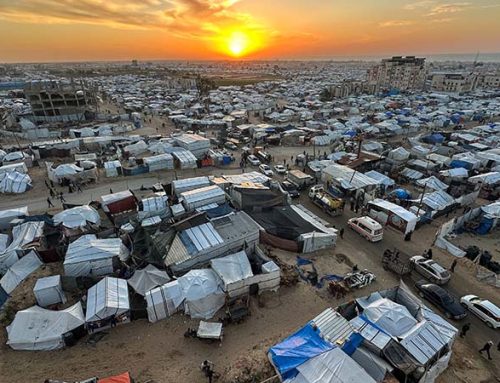As Syria marks the 13th anniversary of the beginning of its civil war on March 15, one Catholic agency says people “should not forget that Syria is the world’s worst displacement crisis.”
In March 2011, popular discontent with the government of Bashar al-Assad led to large-scale protests and pro-democracy rallies across Syria, echoing the Arab Spring protests taking place in other countries.
Assad ordered a harsh response by the military, causing thousands of deaths and detentions. Soon a full-scale civil war erupted. Since the war began, around 600,000 people have been killed – over half of them civilians – and 13.5 million have been displaced, half of these are refugees that fled the country.
CAFOD, the international aid agency of the Catholic Bishops Conference of England and Wales, says the Syrian people have suffered so much since the beginning of the conflict 13 years ago.
“On top of the conflict, the earthquake, the economic crisis and recurrent disease outbreaks, every winter they have to face freezing temperatures, storms and floods, while the funding available to support them keeps decreasing,” said Hombeline Dulière, the CAFOD Program Manager for the Syria Crisis Response.
“One young Syrian refugee I recently met told me about the challenges they face living in Lebanon. Baraa is 18 years old and fled the war in Syria when she was just five – so her whole childhood has been spent as a refugee. At one point she didn’t attend a single day of school for two years,” she said.

A severe shortfall in donor funds has forced the UN to suspend regular food aid in Syria, and the UN Syria Commission of Inquiry reported on March 11 the country is experiencing a wave of violence not seen since 2020.
Paulo Pinheiro, the chairperson of the UN commission said the Syrian people cannot endure any worsening of “this devastating, protracted war.”
“More than 90 percent now live in poverty, the economy is in freefall amid tightening sanctions, and increased lawlessness is fueling predatory practices and extortion by armed forces and militia,” he said.
The UN report says daily life for civilians is worsening, with a deepening economic crisis and rampant inflation, and parties to the conflict variously directly perpetrated, tolerated or were unable to prevent criminal activities such as trafficking, corruption, and extortion backed by violence.
The UN also said schools were affected by the hostilities, noting that on Dec. 2, government forces stationed in Saraqib fired a shell into the courtyard of Afes Martyrs Primary School, minutes after pupils had been called inside, killing one teacher and one student, and injuring two other children.
The UN document said that at the time of the attack, no military activities or objects were reported in the vicinity and the school was forced to close.
Dulière, the CAFOD representative, said last year, almost half of school-aged refugee children in Lebanon weren’t in school.
“The conflict in Syria and resulting refugee crisis in the region have left behind a generation of young people whose right to an education and to a childhood have been denied,” she said.
While the country continues to suffer from the effects of the ongoing conflict, it is also dealing with the effects of the 6.8-magnitude earthquake that hit it on February 6, 2023.
“In Aleppo, buildings are deserted, shops closed, and roaring silence lurks through the streets and along the frontline. Water and electricity are rare and are delivered to communities irregularly,” said Louis Junior Saad, CAFOD’s Emergency Program Officer for the Syria Crisis.
In January, Pope Francis expressed “profound distress for the millions of Syrian refugees still present in neighboring countries like Jordan and Lebanon.”
The pope called on the international community to “encourage the parties involved to undertake a constructive and serious dialogue and to seek new solutions so that the Syrian people need no longer suffer as a result of international sanctions.”
The UN said that amid continuing violence, economic decline and dwindling aid, political and diplomatic efforts remained stalled.
The UN reports notes that the Arab contact group also sought to ensure the voluntary and safe return of refugees, in coordination with relevant United Nations bodies, but says Syria remains unsafe for refugees to return, and civilians continued to be affected by the lack of rule of law and the prevailing insecurity. The report also says that In October 2023, the number of Syrians seeking asylum in Europe reached the highest level in seven years – and was a 30 percent increase from the number in October 2022.
Dulière said people should not forget that Syria is the world’s worst displacement crisis.
“There is now a whole generation who have never been able to live in their own country, have never been to school, and thousands who are still too afraid to return to their homes,” the CAFOD representative said.
By Charles Collins | cruxnow






